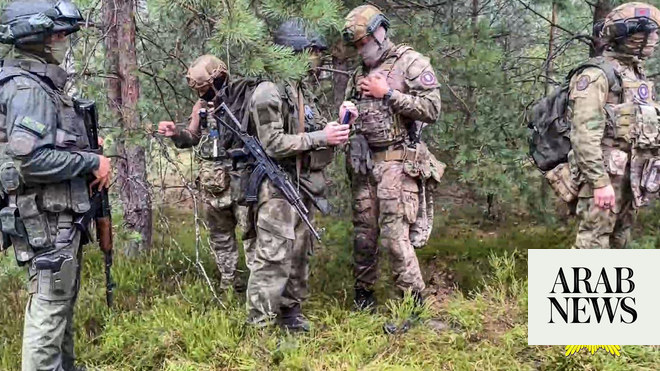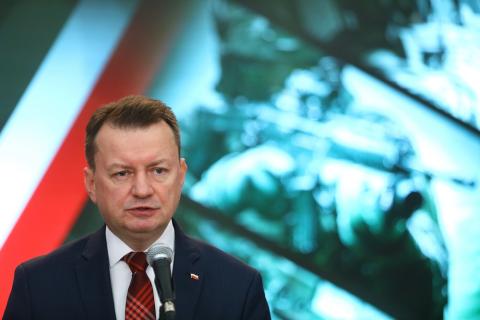
Poland’s defence minister has said the crisis on the Belarusian border could last for months, as Alexander Lukashenko claimed he had agreed to direct talks with the European Union on solving the crisis.
The agreement was reported by Belarusian state media, which said that Lukashenko and the German chancellor, Angela Merkel, spoke on Wednesday for the second time this week.
A spokesperson for Merkel said the two spoke but did not immediately confirm new talks were planned between Lukashenko and the EU. “Merkel underlined the need … to ensure humanitarian care and return opportunities for the people affected,” said the spokesperson Steffen Seibert, saying the European Commission, as well as UN agencies, should be allowed to provide aid.
The calls between Merkel and Lukashenko have angered European governments who do not recognise Lukashenko as the country’s legitimate leader.
“I told the president of Germany that Poland would not recognise any arrangements regarding the situation on the Polish-Belarusian border that would be made over our heads,” the Polish president, Andrzej Duda, said on Wednesday.
Polish forces on Tuesday fired teargas and deployed a water cannon against people trying to cross over in an escalation of a months-long standoff on the EU’s eastern border.
Belarus on Wednesday said its investigators had opened a criminal case against Polish border guards for crimes against humanity over the clashes at the border, as Minsk tried to pin the blame for the crisis on the west.
Thousands of people, mainly from the Middle East, are camped out on the border in what the west says is a crisis engineered by Belarus to divide the EU and hit back against sanctions, charges Minsk has denied.
“We have to prepare for the fact that the situation on the Polish-Belarusian border will not be resolved quickly. We have to prepare for months. I hope not for years,” Mariusz Błaszczak, the Polish defence minister, told Poland’s Radio Jedynka on Wednesday.
Lukashenko’s press service claimed an agreement had been struck that the EU would hold direct talks with Lukashenko about solving the crisis and that he would allow international aid to reach asylum-seekers at the border.
Responding to the claims, a spokesperson for the EU foreign affairs chief Josep Borrell said: “Lukashenko has no legitimacy for the EU, he cannot be considered president since he manipulated the last presidential elections in August 2020. He is on the EU sanctions list for electoral fraud, violation of human rights and continued oppression of his population.”
Until this week, Lukashenko had not spoken with a European leader since he brutally crushed protests against tainted elections in 2020.
Brussels on Wednesday announced it would donate €700,000 (£590,000) to deliver food, blankets, hygiene and first aid kits to asylum-seekers trapped at the border.
“Europe is at the side of the people trapped at the border with Belarus,” said Ursula von der Leyen, the president of the European Commission. “We are ready to do more. But the Belarusian regime must stop luring people and putting their lives at risk.”
That announcement came after Belarus moved an estimated 1,000 migrants into a warehouse in the border region in what it called a humanitarian gesture. Video published by Belarusian state news agencies showed that migrants slept on mattresses on the floor of the transport and logistics facility. International news reports said families were given a hot meal and children were given juice or milk.
However, videos on Wednesday showed that hundreds of people remained in the forests on the border with Poland and Lithuania, where authorities said they were continuing to face attacks on border defences.
Błaszczak said attempts to cross the border had continued during the night, adding that people had used the same “method of attacking the Polish border” as on Tuesday. “The public attention focused on what happened in Kuźnica, while smaller groups of migrants tried to break through the Polish border in other sections, also at night,” he said.
The border guard service said it had detected “161 attempts at illegal crossing” on Tuesday, including “two forceful attempts to cross the border registered during the evening”.
Polish police on Wednesday said nine officers were injured in the clashes on Tuesday, along with a border guard and a soldier. Police said no injured officers were still in hospital.
Belarus on Wednesday temporarily limited oil deliveries through the Druzhba pipeline to Poland. Gomeltransneft, the Belarusian oil pipeline operator, said it was carrying out unscheduled maintenance on the pipeline, Russian state media reported, and the work would not affect monthly targets for oil supplies.
But the temporary shutdown coincided with threats by Lukashenko to shut down gas supplies to Europe in retaliation for new sanctions against his regime.
It also comes a day after Germany announced a temporary suspension of the certification process for Nord Stream 2, a new gas pipeline that has been criticised by European governments as a Kremlin tool of coercion.
EU sanctions are also expected to target airlines, travel firms, and other means of transport for thousands of migrants to the Belarusian border with Poland and Lithuania.
Poland and Lithuania have announced states of emergency in the border region and have prevented NGOs and journalists from accessing the “secure zone”. Press Club Polska, a Polish press organisation, reported that three journalists had been pulled from their car, handcuffed, and had their equipment searched in the village of Wiejki on Tuesday by men in Polish army uniforms. They sustained minor injuries and were released after police arrived.












